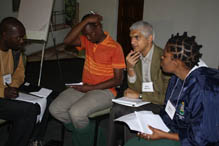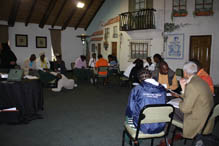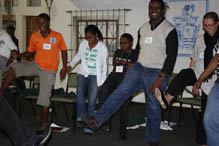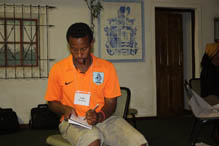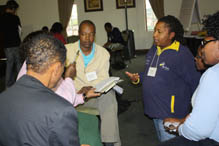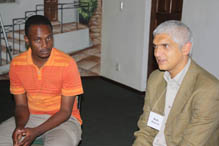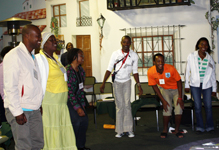
Nelson Mandela Foundation facilitators at the recent learning session held at Valverde Country Hotel
April 28, 2010 – Evaluating community conversations is an important challenge for community conversation facilitators and Nelson Mandela Foundation staff. A group of facilitators recently participated in a learning session at Valverde Country Hotel in Lanseria from April 21to 23, 2010.
The three-day learning session was run by workshop facilitators, Denise Gray-Felder and Ailish Byrne, who have extensive experience in the social dialogue field. Byrne and Gray-Felder are from the Communication for Social Change Consortium (CFSC).
The session introduced community conversation facilitators to participatory monitoring and evaluation (PM&E) as a way of strengthening their work.
Starting in 2007, community conversations were initiated by the Foundation’s Dialogue Programme and have since been run in many localities in all of South Africa’s provinces.
Community conversations provide a platform for people from distressed communities to discuss HIV/AIDS, xenophobia and other issues in a safe, secure and neutral place and to work together to begin to find solutions to such problems.
Facilitators – who are often nominated by residents of their own communities – are charged with organising and conducting community conversations. This learning event was a further step in their training process.
Learning session co-facilitator, Gray-Felder, kicked off the learning session by noting that participatory monitoring and evaluation places communities at the centre of the process and that it typically uses story-telling as a key device. She noted that “learning and change” lie at the heart of effective M&E.
“Our focus is to get people involved in the process so that they can improve their programmes and therefore achieve the goals of community conversations,” she said. “The question we ask today is, ‘how are community conversations working and making a difference in our society?’”
Sibuyiselwe Sontundu, a facilitator from Mthatha in the Eastern Cape said she wants to learn more about the monitoring process and how to put theories into practice. Moshe Lecheko, from Kliptown in Gauteng, shared similar sentiments, saying: “My aim is to learn [as much as I can] so that I can determine [if] we are on the right track.”
Sello Mashibini, from Galeshewe in the Northern Cape, aims to get a full understanding of how the M&E process works and how it can be tied into the process of community conversations. Olebogeng Nkoliswa of Soshanguve, Gauteng, said he hopes to write better reports for local use and for reporting to the Nelson Mandela Foundation. This learning session will help him draft reports with greater confidence and with heightened understanding of how to communicate key achievements and learnings.
Asked how the concept “evaluation” makes them feel, participants said “evaluation” brings to mind notions such as “reflection”, “movement”, “progress”, “awareness” and “discipline”. Others cite associations with “assessment”, “exam”, “observe”, “analyses” and “being checked out”.
Co-facilitator Byrne acknowledges that, for many people the word “evaluation” conjures fear and apprehension. She said the sense of unease arises because many evaluations are externally driven, are undertaken by outside experts and as such, leave people feeling judged.
Gray-Felder asked participants to embrace evaluation; evaluation if undertaken well and in a participatory manner is part of growth and continuous improvement. She noted that evaluation should be viewed as an opportunity to pause, extract learning and build on “what is working”.
The participants in the session examine the difference between “evaluation” and “monitoring”.
It was agreed that monitoring is an ongoing process, a way of checking implementation and seeing if outputs are being achieved according to plan.
Evaluation deals with deeper questions. These include questions about outcomes (intended changes), about “the difference” being made in the community and in people’s lives.
“Evaluation involves digging deeper into things,” said Byrne. “It means asking, during and after activities, ‘so what?’”
Both Byrne and Gray-Felder emphasised the importance of participatory M&E to supplement conventional M&E approaches, in the context of community conversations. They highlighted the benefits, saying “We need to take a participatory approach and involve the community, because when people are involved in the process they respect the findings.”
Gray-Felder referred to the following values, which underpin PM&E:
- Democracy
- Mutual respect
- Active listening
- Integrity
- Trust
- Transparency
- Commitment
- Fairness
She noted that these values are often absent from expert-driven M&E. This causes several problems. Conventional evaluations often disempower the community, they frequently draw conclusions in a manner that is not transparent to those affected, they meet the “upward” needs of donors and boards, but often neglect “downward” accountability to communities being served. Worst of all is that many conventional evaluations don’t sufficiently reflect community voices and perspectives.
Participants debated whether community conversation facilitators are voices of their community, or whether they only speak for themselves. Because facilitators are nominated by communities, some believe it is their duty to be the voice of the community’s members.
Byrne cautions against this saying, “As facilitators we wear many hats. We are brothers, sisters, mothers, wives, daughters and sons, etc. Nobody’s role is fixed and we cannot speak on behalf of the community, unless it’s in very particular circumstances.”
“Communities have hundreds of voices, they cannot just be one voice and our reports need to show that,” she said.
With regards to reports, Byrne encourages the facilitators to allow the voices of the community to come through in their reports, so they “don’t gather dust”.
A member of the Dialogue team asked how participatory M&E meets the objectivity requirements. In response, Gray-Felder indicated that a focus on stories and community voices does not obviate the need for substantiation and verification.
She notes that observations can be backed up by stories, community experiences and perspectives of the various people affected by the issue being discussed, or the project being implemented.
Cross-referencing with information obtained through monitoring is also appropriate. Byrne notes that the findings of a participatory M&E process are strengthened by the stories that often underpin the approach and which can be fed back and cross-checked with community members.
Reflections
Naomi Warren, Dialogue Programme Project Manager
“The aim of this workshop is to create a common understanding of the monitoring and evaluation process. We are very excited about it; it’s great to hear the facilitators’ stories. I hope this workshop makes the communication between us and the facilitators much easier.”
Ailish Byrne, Co-Facilitator, Communication for Social Change Consortium
“This session was challenging but we are starting on the right foot. The participation reassures me that we are touching something inside.”
Deborah Grootboom, facilitator, Cape Town
“I had a great time in this session. I now understand a lot about the evaluation process. My questions were answered well. I think that it will be easy to implement this when I get home.”
Olebogeng Nkoliswa, facilitator, Soshanguve
“This morning’s training was really interesting and intense. I am learning so much and hoping to learn more in the next two days.”
Sello Mashibini, facilitator, Kimberley
“The learning session was very interesting. I expect to grow as a facilitator and know more about monitoring and evaluation so that I can be honest with myself and evaluate myself well.”
In addition to the issues reflected above, drawn from the first day, the three-day learning sessions also covered the following: using stories and the “Most Significant Change” approach; participatory development of indicators, strengthening evaluator skills and attributes and writing better reports. In recognition that PM&E is best learned through practice and over time, the final day focused on follow-up and support necessary to strengthen M&E capacity in the longer term.
